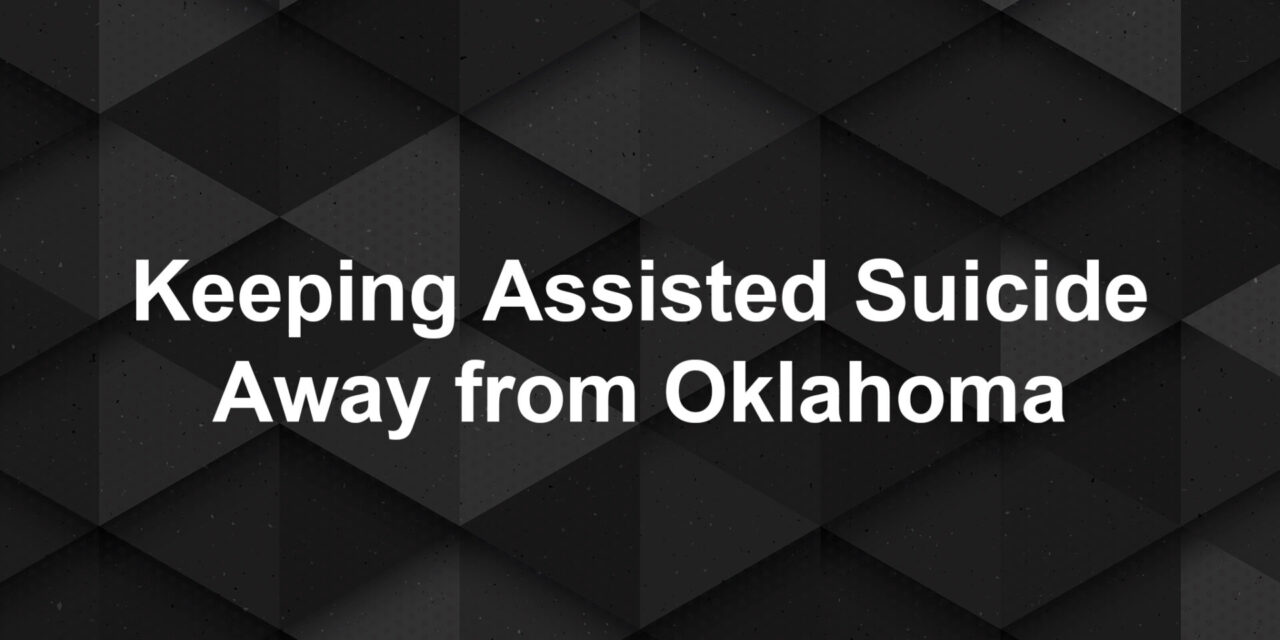In 1998, Americans had our collective conscience shocked when “Dr. Jack Kevorkian was arrested and tried for his role in the … euthanasia of a man named Thomas Youk who had Lou Gehrig’s disease.”
Fast forward to today, and the assisted suicide movement is widespread and has taken hold in areas of the world. Proponents of assisted suicide use deceptive language like “death with dignity.” Pop culture has also peddled the narratives of assisted suicide with movies like “Million Dollar Baby.” So what can Christians do in the face of a culture of death?
1. Recognize the Danger
There are around a dozen states in the U.S. that have permitted assisted suicide in some form. The idea has even been proposed and pushed here in Oklahoma. Meanwhile, numerous countries outside the U.S. have legalized assisted suicide.
Southern Seminary President Albert Mohler, speaking of Canada’s embrace of assisted suicide said, when “you open the door of physician-assisted suicide or any form of euthanasia, you’re responsible for everything that passes through that door.”
He added, “The logic that began with physician-assisted suicide or euthanasia for those who were terminally ill was extended to adults, terminally ill. Then it was extended to adults who weren’t terminally ill but had some diagnosis that they did not want to deal with. Then it was extended to those who had a form of depression or some kind of psychiatric diagnosis. And then it was extended to children, and then it was extended beyond adolescents to younger children. What we’re looking at here is that in Canada, it has now been extended to the disabled. Don’t believe for one minute that the logic that is here chillingly revealed in this action in Canada will stay in Canada.”
2. Respond with Sound Arguments
Part of the way we can defeat bad arguments and ideas is with good ones. In 2024, the Ethics & Religious Liberty Commission (ERLC) of Southern Baptists issued a statement on this important topic, with the
following information:
“Southern Baptists affirm every life is worthy of protection and created in the image of God. We believe in the sanctity of human life from conception to natural death, regardless of age or ability, as expressed in the Baptist Faith & Message.
“Pain and suffering call for compassionate treatment that supports a God-honoring culture of life, not euthanasia. Ethical principles derived from Judeo-Christian and Hippocratic traditions provide compassionate methods of both hospice and palliative care. In a 2001 resolution, Southern Baptists resolved that legalized euthanasia is immoral ethically, unnecessary medically and unconscionable socially.” The ERLC also said, “Physician-assisted suicide is not healthcare. Medicine has been governed for over 2,500 years by the belief it is always wrong to intend to harm one’s patients, including killing or assisting a patient to kill himself or herself.”
3. ‘Maximize Care’ for the Suffering
In his important book, Bioethics and the Character of Human Life, theologian and bioethics expert Gilbert Meilaender wrote, “although compassion surely moves us to try to relieve suffering, there are things we ought not to do even for that worthy end—actions that would not honour or respect our shared human condition. One of the terrible truths that governs the shape of our lives is that sometimes there is suffering we are unable—within the limits of morality—entirely to relieve. Hence, the maxim that must govern and shape our compassion should be ‘maximize care,’ which may not always be quite the same as
‘minimize suffering.’”
The individuals who may contemplate assisted suicide need us to stand with them and for them. They need us to maximize care for them, instead of unethically ending their lives. In the Hippocratic Oath, physicians swear to “Do No Harm,” and Christians must abide the same values.
The assisted suicide movement is not going away any time soon, but by these and other actions, we will be in a better place to thwart a culture of death and advance a culture of life.




